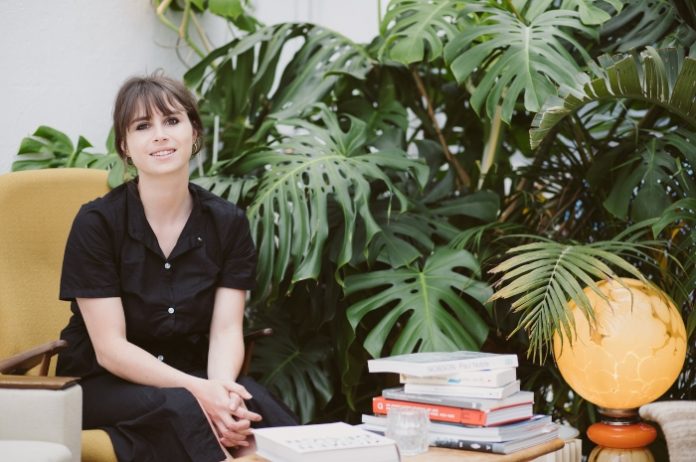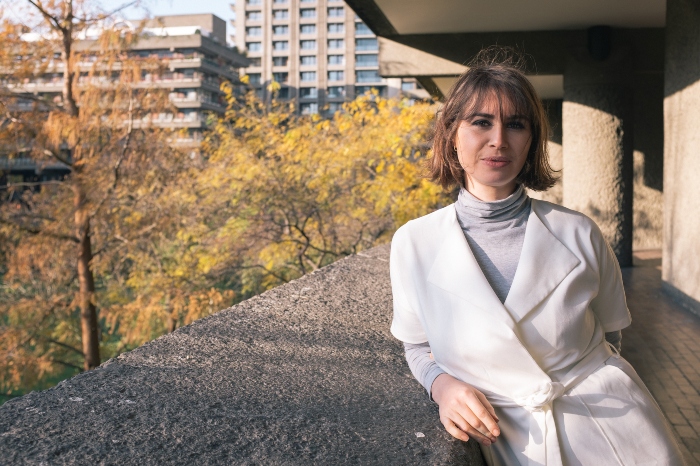Alexandra Lunn is a graphic designer who combines her experience and background in design with social media marketing to help her clients stand out. Her playful approach is tempered by a systematic process, resulting in bold, dynamic visual identities, and happy clients. After time spent in Amsterdam and Budapest, Alexandra began freelancing in 2014. Since then, she has opened a London based graphic design studio, catering for the arts and cultural industries. Lunn shares some of the lessons she’s learned, and offers some advice for those who are still at the beginning of their entrepreneurial journey.
Q Where does your entrepreneurial spirit come from?
A From the beginning I’ve had an entrepreneurial streak. As a child I terrorised the stall holders at local boot-sales with my haggling. As a teenager, I became a playground sweet-peddler, buying up flumps and freddos to sell to friends at a profit. In 2017, after pursuing a string of low-paid internships, I opened Alexandra Lunn Studio and ever since then, business has been booming. So, this year I decided to set up as a Ltd company.
Q What is it you love most about what do you do?
A Working creatively is about finding your own path to the best solution. Doing your own thing means thinking differently — and you can’t do that without paying attention to other people’s stories. I love building a close relationship with my clients, learning why they do what they do, and where they first discovered their talents. I work with any business that thinks differently and wishes to stand out with bold and vibrant design. Learning about different industries and discovering how they operate are what I enjoy. Every project is an invitation to understand a little more about the world — and the more I understand about the world, the more my creative work benefits.
Q What has been your scariest moment as an entrepreneur?
A Everybody makes mistakes sometimes, but when it involves thousands of pounds, it takes the pressure to a completely new level. There have been moments where things have gone wrong — but I’ve always thought it important to push myself beyond that initial disquiet, because I think there’s a lot of hidden power in it. Fear usually arrives hand-in-hand with adrenaline, and I’ve learned to take those feelings and use them to my advantage — like skitching, it’s about making use of that momentum.
Q What has been your proudest moment?
A I think I’ve now reached a point where I can pause, look back and be pleasantly surprised by how far I’ve come — so I’m enjoying that feeling at the moment. As entrepreneurs, I think it’s important to celebrate the stepping stones we’ve conquered, since it’s very easy to tumble into the next project without taking the time to really appreciate our success stories. So, I have pride for what I’ve achieved, but I don’t want to take in the view forever — I know how I’m going to take things forward.
Q What is the biggest lesson you have learned from founding your own company?
A We’re all responsible for teaching other people how to treat us. People will only value you as much as you value yourself, so I’ve learned to bring an energy of self-respect to every interaction I have with my clients. I started my studio because I couldn’t shake the feeling that I was worth more — and carrying that belief with me encourages other people to recognise it too. In this industry, self-worth is really important. Growing up I was a bit of an outsider. It took a while for me to recognise that being different is a tremendous asset. My clients come to me for something different, so I’ve learned to lean into that. Home Business’s interview with Gina Cloud offered some advice with regards to finding your own path to success.
Q That raises a good question — what does your own path to success look like?
A Success for me means happy clients, a portfolio of work that’s interesting and helps them to stand out in different ways, financial security and autonomy when it comes to my work. But it’s also about maintaining a positive mind-set. I think it’s nearly impossible to sit with success until you’ve established a foundation of positivity in your own head. For me success is happiness, and not the other way around. I like that happiness has the potential to be an infinite thing. What’s the point in financial security if all you can do is worry about losing it? How can you present your portfolio with confidence if you can only dwell on the things you would have done differently or if you’ve done a half baked job?
Q Has a mistake ever led you to success?
A Whilst working in an internship at a design studio in Amsterdam I wanted to impress my first design employers; I was so eager to please that without them asking me to, I would work weekends to try to get the job done. They gave me the task to proof-read some really dense pieces of text, which I was more than happy to do. However, my expertise are in visual design and although I am a native English speaker, the syntax and grammar still didn’t quite get there. I fell flat on my face. I didn’t give myself enough down-time and as a result I produced shoddy work during the week.
Here is what I quickly learned: When overworked and cutting corners, it shows. Thereafter I made sure to give myself plenty of rest and after moving to London I started to say no to projects that weren’t in my area of expertise. Taking a look at my work ethic, I made some necessary changes which have served me well ever since. Now I collaborate with writers to produce well copy that accompanies our design work and social media strategies.
Q What type of person makes a great graphic artist?
A Being an emotionally sensitive person is great for creativity; and being a natural people-pleaser is helpful when providing your clients with the best. However, without assertiveness, toughness and good project management skills to balance the scales, you can come up against some serious problems. I’m a fierce advocate for the practice of visiting a dream world every now and then. You can’t spend too much time there if you want to get paid.
Since running my own business, I’ve always accepted 50% of the overall payment as a deposit invoice; this secures our time and commitment on the project, However, recently an existing client asked me to accept just one payment at the end of the project. I believed they would pay me on time, so we created a training manual for their staff — which they described as excellent.
Three months on, we’re still waiting to be paid. So I made a change to our process, and now we accept the full payment before we carry out any work. It’s working much better for everyone and also builds trust and confidence between ourselves and our clients. The lesson I learned is that there’s a lot of trial and error when you’re running a business. As long as you can learn from your mistakes, and change your approach moving forward, that’s a very good thing.
Q What one thing do you wish someone had told you when you first started out?
A Honestly, I wouldn’t be where I am now if it wasn’t for the experiences I’ve had as a result of figuring things out for myself. Simon Sinek says business is an infinite game, and I really subscribe to that idea. I like the spontaneity and creativity of making things up as I go along, and I know I wouldn’t have as much confidence if I hadn’t had the opportunity to learn through the things that went wrong. Like Elizabeth Day says, “out of crisis comes clarity, and sometimes even catharsis”.
Q What’s the best piece of advice you could offer to somebody who’s thinking of taking the plunge into entrepreneurship?
A Think about whether or not your personality type could deal well with all of the uncertainty associated with doing your own thing (or whether you could adjust your mind-set to make it work) and then if it is for you, go for it. Get a good mentor, it can only help your work to interact with people who have a different point of view. Write down some achievable goals and stay focused on them. Entrepreneurs should focus on developing resilience, maintaining positivity, and managing emotions. Some of these things take time, practice, and a few false starts. But that’s okay too.
Visit www.alexandralunn.com and contact her on Twitter, Facebook, and LinkedIn.
Find a Home-Based Business to Start-Up >>> Hundreds of Business Listings.
















































